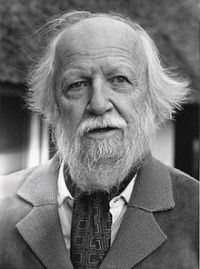
A plane crashes on an uninhabited island and the only survivors, a group of schoolboys, assemble on the beach and wait to be rescued. By day they inhabit a land of bright fantastic birds and dark blue seas, but at night their dreams are haunted by the image of a terrifying beast. In this, his first novel, William …

Eight Neanderthals encounter another race of beings like themselves, yet strangely different. This new race, Homo sapiens, fascinating in their skills and sophistication, terrifying in their cruelty, sense of guilt, and incipient corruption, spell doom for the more gentle folk whose world they will inherit. Golding, …

The Spire is a 1964 novel by the English author William Golding. "A dark and powerful portrait of one man's will", it deals with the construction of the 404-foot high spire loosely based on Salisbury Cathedral; the vision of the fictional Dean Jocelin. In this novel, William Golding utilises stream of consciousness …

Pincher Martin: The Two Deaths of Christopher Martin, is a novel by British writer William Golding, first published in 1956. It is Golding's third novel, directly following The Inheritors, which in turn came after his magnum opus and debut Lord of the Flies. The novel is one of Golding's best-known novels, and is …

Darkness Visible is a 1979 novel by British author William Golding. The book won the James Tait Black Memorial Prize. The title comes from Paradise Lost, from the line, "No light, but rather darkness visible". The novel narrates a struggle between good and evil, using naïveté, sexuality and spirituality throughout. It …

Free Fall is the fourth novel of English novelist William Golding, first published in 1959. Written in the first person, it is a self-examination by an English painter, Samuel Mountjoy, held in a German POW camp during World War Two.

The Paper Men is a 1984 novel by British writer William Golding. The protagonist in the novel is Wilfred Barclay, a curmudgeonly writer who has a drinking problem, a dead marriage, and the incurable itches of middle-aged lust. Barclay is irritated by a young professor, Rick Tucker, who is determined to write Barclay's …

 English
English Español
Español Deutsch
Deutsch


